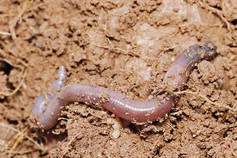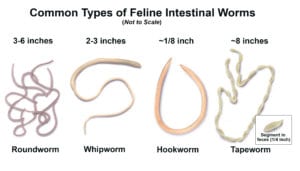Roundworms Study Guide
Introduction
Roundworms or nematodes are tiny parasitic organisms that can thrive, grow and multiply within the intestines of humans, dogs, etc. They may cause infections like fever, diarrhea, abdominal pain, etc. They are called parasites since they are typically found in other living organisms as the host.
Roundworms
- As the name suggests, Roundworms are round and long in shape and may have varying sizes depending on the species.
- They have openings on either end of the body and range from lower than one millimeter to over three feet in length.
- The typical size is 5-100 micrometer thickness and 0.1-2.5mm in length.
- They have a fully developed digestive system that enables them to ingest food, digest it, and eliminate the waste products altogether.
- They also have a pseudocoelom and are covered with a tough layer of collagenous cuticle on the outer surface of their body. This helps them have a fluid pressure within the pseudocoelom which gives rise to a hydrostatic skeleton.
- They can move effortlessly on any solid surface as the hydrostatic skeleton gives a counterforce for those muscles lining the pseudocoelom and allows them to contract and move.
Ecology of Roundworms

There are close to one million different species of roundworms on the earth. They are either parasitic or free-living and are found in diverse environments. They may be found in terrestrial, marine, and freshwater environments or deserts, mountains, and ocean trenches, and every part of the earth’s lithosphere.
Their diverse life cycles and presence at different trophic levels in the food chains point to the fact that they play important roles within the various ecosystems. There are about 2,271 genera and 256 families of nematodes, and approximately 35 species are found in humans.
Reproduction of Roundworms
- There are male and female nematodes that have either one or two tubular gonads.
- The sperms produced at the end of the gonad in males move along the length upon maturing.
- They have a seminal vesicle, testis, vas deferens, and cloaca, along with an ejaculatory duct which is used during intercourse.
- The females have ovaries, oviduct, uterus, vulva, and a vagina.
- They reproduce sexually as the male spicules emerge from the cloaca and get inserted into the female genital pore releasing the sperms.
- There are many more modes of reproduction, like some are hermaphroditic, who store the self-fertilized eggs within their uterus till hatching.
- Meiotic parthenogenesis, facultative sexuality, mitotic parthenogenesis, cloning or cell division of female ova, etc., are some more reproduction methods.
Types of Parasitic Roundworms

Roundworms in humans may be Ascaris(ascarids), Enterobius (filarias, hookworms, pinworms), and Trichuris trichiura (whipworms). The other species which infect other animals are Trichinella spiralis in rats, pigs, bears, and humans which causes trichinosis, Dirofilaria immitis in dogs and cats, Haemonchus contkrtus in sheep, etc.
Diseases caused by Nematodes
1. Ascarisis
An infection of the small intestine and lungs caused by the species Ascaris lumbricoides is the most common roundworm infection. Symptoms of roundworms in humans include wheezing or shortness of breath, blood in the mucus, fever, coughing, discomfort in the chest, etc. in long infections and vomiting, diarrhea, intestinal blockage, stools with visible worms, abdominal pain, growth impairment in children, etc. when the intestines are infected.
2. Trichuriasis
Also known as whipworm, this infection is caused by Trichuris trichiura or the whipworm, especially in places of poor hygiene. Symptoms of worms in humans include diarrhea, abdominal pain, anemia, etc. Roundworm treatment is done with albendazole, ivermectin, mebendazole, etc..
3. Hookworm Disease
Is caused by Necator americanus and Ancylostoma duodenale. The disease is spread by skin exposure to larvae in contaminated soil with feces. Symptoms include rash with itching, gastrointestinal problems, respiratory problems, iron deficiency anemia, etc. Roundworm medicines which are antihelminthic like mebendazole and albendazole, are normally used to treat hookworm infections.
4. Filariasis
Filariasis or helminthiasis caused by the Filarioidea roundworms is spread by insects that suck blood like mosquitoes and black flies. Wuchereria bancrofti causes lymphatic filariasis, Brugia malayi, and Brugia timori. Subcutaneous filariasis is caused by Loa low or the eye worm, Mansonella streptocera, etc., and infects areas under the skin. Mansonella perstans and Mansonella ozzardi cause serous cavity filariasis.
Symptoms include elephantiasis, edema, and skin thickening normally occurring on the lower body extremities. Subcutaneous infections appear as rashes, arthritis, hyper and hypopigmentation macules, urticarial papules, etc. Treatment is done with albendazole, ivermectin, diethylcarbamazine, etc.
Conclusion:
- Even though roundworms are found worldwide, they are more predominant in the subtropical and tropical parts like sub-Saharan Africa and Latin America.
- It is also common in areas with a lack of hygiene.
FAQs:
1. How do you tell if you have roundworms?
Suppose you have symptoms like diarrhea, vomiting, visible worms on a stool, lack of appetite, abdominal pain, backstage in intestines, loss in weight, etc. In that case, the possibility of having roundworms is high.
2. How do humans get rid of roundworms?
Treatment with drugs like albendazole, mebendazole, ivermectin, etc., helps get rid of roundworms.
3. How did my dog get roundworms?
When roundworm-infested stools are present in the soil, sniffing dogs may get infected by licking it.
4. Can I get roundworms from my dog licking me?
Yes, roundworms can be passed from an infected dog licking you.
5. How bad are roundworms in dogs?
Serious infection in dogs may manifest as diarrhea, vomiting, lack of appetite, loss of weight, pain in the abdomen, and even death in puppies.
6. How do I get rid of roundworms in my yard?
Laying a plastic covering on the yard’s surface and weighing it down with bricks for about four weeks will make sure that the roundworms get baked with the sunlight and die.
7. Do dogs poop out worms after deworming?
Worms may be visible in dog stools up to two to three days after deworming.
8. How do you prevent roundworms in dogs?
Keeping the dog away from other wild animals and deworming the dogs every few weeks can ensure your dog doesn’t get roundworms.
9. Is roundworm in dogs fatal?
Yes, roundworms may be fatal in young dogs or puppies.
We hope you enjoyed studying this lesson and learned something cool about the Roundworms! Join our Discord community to get any questions you may have answered and to engage with other students just like you! Don’t forget to download our App and check out our awesome VR room for this guide – we promise, it makes studying much more fun 😎
]]>